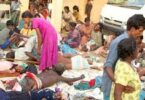Stephen Browne
AlUla, the ancient oasis in the northwest of Saudi Arabia, is currently undergoing a comprehensive regeneration aimed at rejuvenating its native flora and fauna. This is crucial for reinstating the ecological equilibrium and embracing international conservation standards while fostering sustainable tourism practices.
The Royal Commission for AlUla is spearheading these efforts, with the belief that conserving biodiversity is foundational to the creation of a successful tourism destination. Collaborations with organizations such as the International Union for Conservation of Nature ensure that we also leverage global expertise for sustained success.
Supported by rigorous scientific research and meticulous planning, these initiatives entail the restoration of fragile desert ecosystems and the reintroduction of native species. During the latest animal-reintroduction program, launched in 2023, about 1,000 animals from four species — Arabian gazelle, sand gazelle, Arabian oryx and Nubian ibex — were released into nature reserves in AlUla, including at Sharaan, Wadi Nakhlah and Gharameel. Ultimately, we aim to reintroduce the critically endangered Arabian leopard into the wilds of AlUla.
Central to our vision is the development of AlUla as a world-class eco-tourism destination, where visitors can experience the wonders of nature while contributing to its conservation.
We are committed to promoting responsible tourism practices that enable visitors to explore AlUla’s desert landscapes while educating them about the importance of preserving biodiversity and respecting wildlife habitats. By offering guided nature walks and tours led by knowledgeable local guides, and implementing strict guidelines for wildlife viewing and photography, we ensure that visitors can experience the beauty of AlUla’s desert while minimizing disturbances to its delicate ecosystem.
Furthermore, AlUla prioritizes eco-friendly infrastructure, from low-impact accommodations to carbon-conscious transportation options, thereby ensuring harmonious coexistence with nature.
Our focus on native plants cultivated at AlUla Plant Nursery and Seed Bank exemplifies this dedication and plays a pivotal role in reforestation efforts and community involvement. Starting from almost zero native plant seeds and seedlings in 2019, the nursery has collected seeds and cuttings from more than 80 species of plants and produces seedlings from more than 60 species.
The nursery’s efforts have led to the planting of nearly 300,000 trees and bushes, with the involvement of the community, which fosters a strong sense of stewardship among the people of AlUla.
AlUla’s rich botanical tapestry is also the subject of the next publication, “AlUla Flora,” from luxury publisher Assouline. The tome showcases the natural splendor of this ancient oasis through original photography, illustrations and artwork covering more than 80 diverse species, both native and introduced, that are thriving in AlUla’s landscape. Some plants have an interesting history of use in Bedouin crafts or traditional medicines, while others are prized for culinary reasons.
By integrating conservation efforts with responsible tourism practices, other destinations in Saudi Arabia and around the world can join AlUla in striking a balance between visitor enjoyment and environmental stewardship.
Through collaboration with local communities, conservation organizations and tourism stakeholders, we have a model for sustainable tourism that not only preserves AlUla’s natural heritage but also contributes to the well-being of its inhabitants.
Together, we can ensure that future generations have the opportunity to experience the wonders of AlUla’s desert while safeguarding its ecological integrity.







